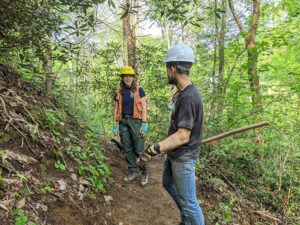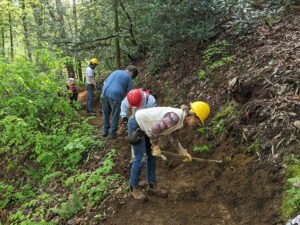
Home » Academic Degree Programs » Continuing Education and Workforce Development » Trail Construction and Sustainability » Intermediate Trail Training Program
Share:
Facebook
Twitter
LinkedIn
Trail Construction and Sustainability Program
Intermediate Trail Training Program (160.5 Hours Minimum)
NCCER Core Curriculum: 70.5 Hours
 This course of instruction provides individuals an overview to the various fields of basic safety, introduction to construction math, hand tools, power tools, construction drawings, basic rigging, basic communication skills, basic employability skill and materials handling. Students will develop knowledge of the skills related to the Core curriculum and how it applies to work in the industrial trades. This course supports integrating of academic and technical knowledge and skills. Students will learn, apply and transfer knowledge and skills to a variety of settings and problems including employment at an industrial site. Knowledge about career opportunities, requirements and expectations plus the development of workplace skills will prepare the students for future success. Students completing the required coursework will receive credit from NCCER for Core.
This course of instruction provides individuals an overview to the various fields of basic safety, introduction to construction math, hand tools, power tools, construction drawings, basic rigging, basic communication skills, basic employability skill and materials handling. Students will develop knowledge of the skills related to the Core curriculum and how it applies to work in the industrial trades. This course supports integrating of academic and technical knowledge and skills. Students will learn, apply and transfer knowledge and skills to a variety of settings and problems including employment at an industrial site. Knowledge about career opportunities, requirements and expectations plus the development of workplace skills will prepare the students for future success. Students completing the required coursework will receive credit from NCCER for Core.OSHA 10 Certification: 10 Hours
The OSHA Outreach Training Program for Construction Industry provides training for entry level workers and employers on the recognition, avoidance, abatement, and prevention of safety and health hazards in workplaces in general industry. The program also provides information regarding workers’ rights, employer responsibilities, and how to file a complaint. Through this training, OSHA helps to ensure that workers are more knowledgeable about workplace hazards and their rights.
Intermediate Sustainable Trail Assessment and Maintenance: 16 Hours
In this course, participants learn about the comprehensive management of natural surface trails. Participants discuss trail assessment, trail facilities, signage, maintenances, wet weather trail closure, and other current issues. Classroom teaching and experiential learning are combined to understand critical trail assessment. Participants discuss how trail condition, maintenance, and safety can affect the “trail experience,” and they conduct a desktop trail system review. Participants learn how the interpretation of assessment results may vary depending on user group and trail difficulty.
Trail Management: Slope, Soils, and Forest Types: 8 Hours
 This course prepares the student to identify locations best suited for trail construction by determining slopes, soils, and forest types. Through classroom training, students will be guided through the various scenarios for trail construction and take into account for the environmental factors such as erosion that affect trail sustainability. Students will also participate in practical settings to identify areas of concern for future trail development.
This course prepares the student to identify locations best suited for trail construction by determining slopes, soils, and forest types. Through classroom training, students will be guided through the various scenarios for trail construction and take into account for the environmental factors such as erosion that affect trail sustainability. Students will also participate in practical settings to identify areas of concern for future trail development.

